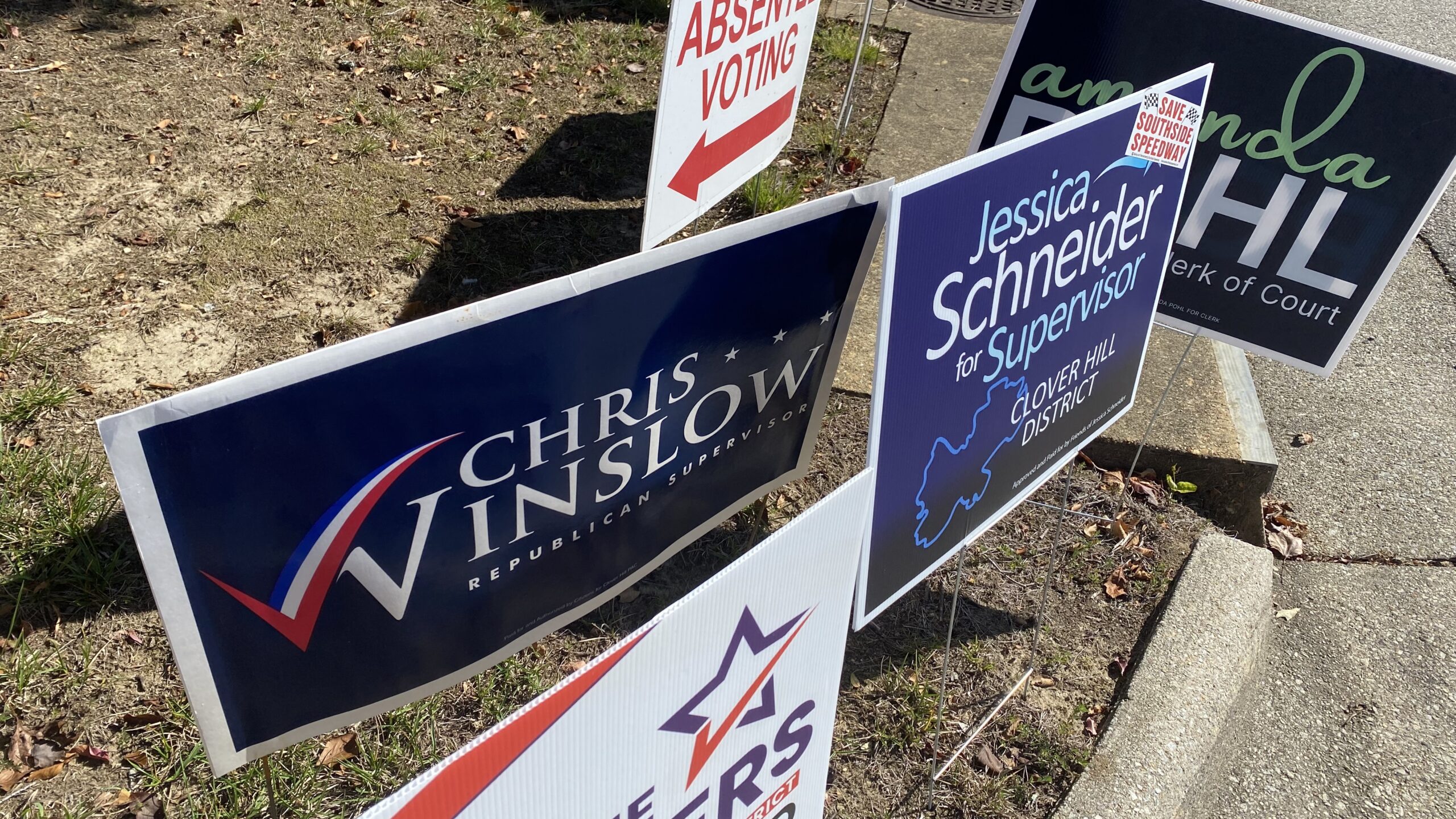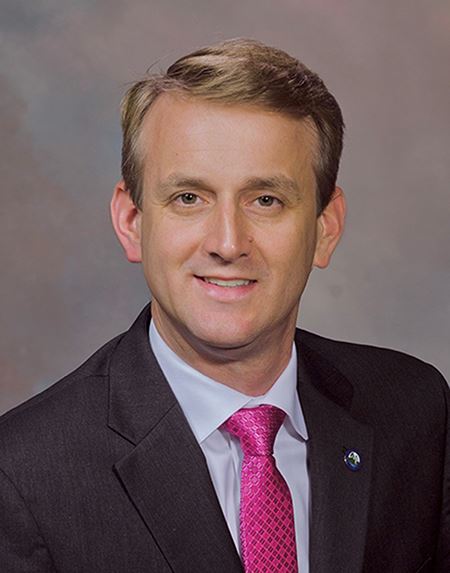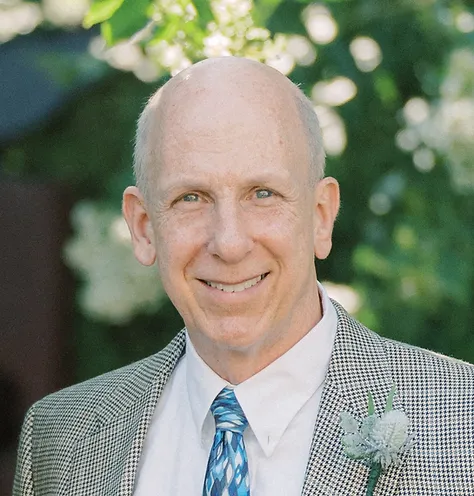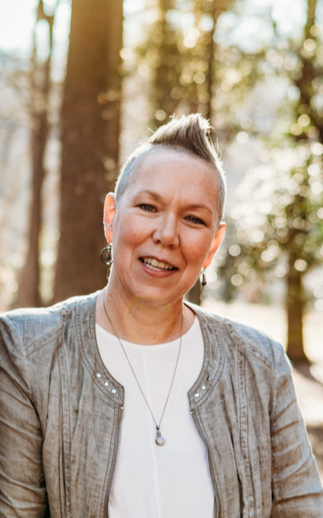
Chris Winslow, Jessica Schneider and Greg Allen are running in the Clover Hill district in Chesterfield County. (Jack Jacobs photo)
Editor’s note: This is the third in a series of discussions with the candidates vying for seats on Chesterfield County’s Board of Supervisors. Four of the five districts are contested going into next month’s election.
In the race for the Clover Hill district’s board of supervisors seat in Chesterfield, incumbent Chris Winslow is facing a former county planner as well as a Democratic challenger.
Winslow is a Republican seeking a third term on the board. His independent opponent is Greg Allen, who worked in the county’s planning department for years. On the Democratic ticket is Jessica Schneider, who has held several roles in the Bexley Homeowners Association.
On the question of the county’s growth, Allen advocates a redirection of development, while Schneider would like to see development slowed. Winslow said a combination of market forces and the current supervisors’ decision to build in phasing for projects are working together to manage growth.
Winslow said that he felt the rate of rezoning and development in Chesterfield has tapered off in the last year as a result of larger economic forces.
“What you’ve seen over the last year is a slowdown,” Winslow said. “A lot of the slowdown is going to be natural as part of a business cycle and we’ve certainly seen that in the county.”
Winslow said that where there are delays in road infrastructure projects, it’s largely out of the county’s control, and that he has supported and would continue to support mandating phasing requirements for projects as a means to try to stay in line with infrastructure projects.
“As we get caught up, we have to build in time and number restrictions,” Winslow said. “I do think you’re going to see more of that as we await these projects coming out of the ground.”
Winslow pointed to recent major economic developments in Chesterfield like announcements of the arrival of Lego, Carvana and indoor farming company Plenty as wins during his time on the board. He said he has also been supportive of small business growth in the county and favored the county’s business-relief efforts during the height of the COVID-19 pandemic.
Winslow said he is in favor of identifying property in the county for a new industrial park on the scale of Oak Lake Business Center off Genito Road.
According to the county’s November 2022 special focus plan for the area that includes the business park, Oak Lake had more than 50 businesses in industries like retail, recreation and manufacturing at the time of the plan’s adoption.
In doing so, Winslow said the county would be able to create more opportunities for local businesses to get up and running.
“Those serve as small business incubators, really, and it would be good to identify a site for that and start planning that area,” Winslow said.
He said that during his tenure the county added a small-business liaison to the economic development department staff and he would be in favor of adding another one to further support local businesses.
“I think we see a need for additional staff to serve as that liaison point for our small business community,” he said.
Allen said he would push to encourage developers to redirect their energies away from western areas of the county, where he said recent development trends have led to over-capacity schools. He said he would be more inclined to sign off on rezonings and approve exemptions requests for developments that are not in places like western Midlothian and the west side of Swift Creek Reservoir.
“We shouldn’t be building higher density near any of the schools that are over capacity,” Allen said.
Generally, Allen’s game plan would be to review which schools are over capacity, and then take stock of how much developable land is within their boundaries. If it’s the case that an under-capacity school has a deficiency of developable properties, he would be in favor of exploring redistricting to match up more-empty schools with areas for developers to build the development that would fill them out.
Allen said the desired effect would be a better distribution of density across the county that would match up with existing infrastructure.
“I’m not seeing any vision by our current board on how we’re going to grow in a way that provides the adequate infrastructure for roads and schools, or any of these things that will help us keep growing, that won’t hurt the livability of the county,” Allen said.
Allen is also in favor of a greater emphasis on place-making in the county. He would be supportive of policies and development that would result in multiple mixed-use developments spaced several miles apart from each other and feature pedestrian, bike and bus infrastructure amid mixed-used construction to create a “village” sense of atmosphere. He pointed to aging shopping centers as sites for such projects.
“What you want to achieve is you’re driving along an arterial road and you’re mostly seeing one- and two-story buildings and then there’s pedestrian access, street trees, three- to four-story buildings. All those things that start to speak to being in a village,” he said. “Instead of being an endless suburb, we have a series of places with names.”
Schneider wants to take things a step further in terms of slowing development. She said she supports a temporary stop on zoning approvals for “large” housing developments because she thinks the county’s infrastructure needs time to catch up to residential growth, though that isn’t something Chesterfield would be able to unilaterally implement.
“Our infrastructure isn’t able to keep up with this. Our schools are completely overpopulated,” Schneider said. “We’re not taking into full consideration the amount of population growth we’re having.”
Schneider said more study would be needed to determine how and where in the county to implement a hold on zoning approvals. Some help from state lawmakers would also be in order. State law requires that zoning applications be considered and reviewed by local governing bodies, and requests can’t be outright prohibited as a rule. The General Assembly would need to approve a reversal of that policy.
Schneider said the current Board of Supervisors approves too many exemptions for zoning cases, and she would be supportive of fewer exemptions being granted.
“Why bother having those ordinances and the planning process if you’re not going to follow it,” she said.
If elected, Schneider said she would be supportive of additional expansion of GRTC bus service in Chesterfield, particularly along Hull Street, as a way to reduce congestion on county roadways.
“We need to take it seriously and not just as a trial run kind of thing. I would encourage us putting in bus shelters and crosswalks,” she said.
The candidates also discussed the county’s ongoing study of potentially loosening residential development rules in rural areas. While the board recently gave the thumbs down to a staff proposal to consider zoning requests for new public roads leading into residential projects in areas with the agricultural (A) zoning designation, it’s expected that staff will return to the board at some point with a tweaked but similar proposal that would have the same result.
Currently, the ordinance doesn’t allow the extension or creation of a road for a residential development in agriculturally zoned areas, which has the effect of limiting the ability to build by-right residential development in such areas.
Winslow said the previous proposal needed more work and he’s interested in what kind of tweaks county staff make to the proposal.
“I think there’s a way to get here but this is something I think needs more discussion,” Winslow said.
Allen said the proposal needs more public input and that he could support it if he felt residents were behind it.
“It was a very striking ordinance that wasn’t really brought up to the public very much. It takes our existing allowance of 5-acres lots and says, ‘What if we allowed new rural roads that serve a larger quantity of 5-acre lots?’”
Schneider doesn’t support the proposal because it would lead to further development in rural parts of the county.
“It opens up a huge can of worms and makes it way too easy for developers to pick and choose land,” she said.
On the topic of taxes, Schneider would support creation of a meals tax as a means to generate revenue for capital projects, and said she envisioned a 2 percent to 3 percent rate.
“We have a lot of infrastructure needs that aren’t being met that I think a meals tax would help,” Schneider said.
Winslow said he would be supportive of an increase to the threshold at which Chesterfield collects its business professional and occupational license tax (BPOL). Currently, Chesterfield’s threshold is $500,000. He doesn’t support the creation of a meals tax.
Allen said he doesn’t favor any tax rate increases, including the creation of a meals tax in Chesterfield.
Chesterfield County is underway on an update to its zoning ordinance, a project called Zoning Ordinance Modernization or ZOMod. Winslow said while it was still a work in progress, he worried the project’s stated goal of reducing the county’s usage of conditional-use plan of development permits – which are for planned developments that differ enough from other conditional uses that further exceptions and standards are deemed necessary – goes too far.
“ZOMod in its current form seems to eliminate the CUPD and I’m not certain that’s a good thing. I think the board should probably retain the CUPD because it’s still that catch-all,” he said.
Allen was critical of what he considered the too-frequent occurrence of the board approving exemptions in zoning cases. He said he felt the ZOMod project is a vehicle to allow developers to no longer need to ask for exemptions and would be supportive of further consideration that would include greater public outreach.
“I feel like the county is moving forward with ZOMod with their head in the ground,” Allen said. “It needs to be denied. We need to engage our citizenry to talk about our future as a high-density county.”
Within the Clover Hill district is the shuttered Southside Speedway property. The county last month issued a request for proposals to find an operator that would bring auto racing back to the site. The deadline to submit pitches is today.
Winslow said he supports the county’s approach as a way to find an operator with the ability to make the venue viable.
“Hopefully this public process will spur conversions and an investment group that can show the vision and financial (backing) to push this over the finish line,” Winslow said.
Allen and Schneider both said they support a return of auto racing to the track.

Chris Winslow, Jessica Schneider and Greg Allen are running in the Clover Hill district in Chesterfield County. (Jack Jacobs photo)
Editor’s note: This is the third in a series of discussions with the candidates vying for seats on Chesterfield County’s Board of Supervisors. Four of the five districts are contested going into next month’s election.
In the race for the Clover Hill district’s board of supervisors seat in Chesterfield, incumbent Chris Winslow is facing a former county planner as well as a Democratic challenger.
Winslow is a Republican seeking a third term on the board. His independent opponent is Greg Allen, who worked in the county’s planning department for years. On the Democratic ticket is Jessica Schneider, who has held several roles in the Bexley Homeowners Association.
On the question of the county’s growth, Allen advocates a redirection of development, while Schneider would like to see development slowed. Winslow said a combination of market forces and the current supervisors’ decision to build in phasing for projects are working together to manage growth.
Winslow said that he felt the rate of rezoning and development in Chesterfield has tapered off in the last year as a result of larger economic forces.
“What you’ve seen over the last year is a slowdown,” Winslow said. “A lot of the slowdown is going to be natural as part of a business cycle and we’ve certainly seen that in the county.”
Winslow said that where there are delays in road infrastructure projects, it’s largely out of the county’s control, and that he has supported and would continue to support mandating phasing requirements for projects as a means to try to stay in line with infrastructure projects.
“As we get caught up, we have to build in time and number restrictions,” Winslow said. “I do think you’re going to see more of that as we await these projects coming out of the ground.”
Winslow pointed to recent major economic developments in Chesterfield like announcements of the arrival of Lego, Carvana and indoor farming company Plenty as wins during his time on the board. He said he has also been supportive of small business growth in the county and favored the county’s business-relief efforts during the height of the COVID-19 pandemic.
Winslow said he is in favor of identifying property in the county for a new industrial park on the scale of Oak Lake Business Center off Genito Road.
According to the county’s November 2022 special focus plan for the area that includes the business park, Oak Lake had more than 50 businesses in industries like retail, recreation and manufacturing at the time of the plan’s adoption.
In doing so, Winslow said the county would be able to create more opportunities for local businesses to get up and running.
“Those serve as small business incubators, really, and it would be good to identify a site for that and start planning that area,” Winslow said.
He said that during his tenure the county added a small-business liaison to the economic development department staff and he would be in favor of adding another one to further support local businesses.
“I think we see a need for additional staff to serve as that liaison point for our small business community,” he said.
Allen said he would push to encourage developers to redirect their energies away from western areas of the county, where he said recent development trends have led to over-capacity schools. He said he would be more inclined to sign off on rezonings and approve exemptions requests for developments that are not in places like western Midlothian and the west side of Swift Creek Reservoir.
“We shouldn’t be building higher density near any of the schools that are over capacity,” Allen said.
Generally, Allen’s game plan would be to review which schools are over capacity, and then take stock of how much developable land is within their boundaries. If it’s the case that an under-capacity school has a deficiency of developable properties, he would be in favor of exploring redistricting to match up more-empty schools with areas for developers to build the development that would fill them out.
Allen said the desired effect would be a better distribution of density across the county that would match up with existing infrastructure.
“I’m not seeing any vision by our current board on how we’re going to grow in a way that provides the adequate infrastructure for roads and schools, or any of these things that will help us keep growing, that won’t hurt the livability of the county,” Allen said.
Allen is also in favor of a greater emphasis on place-making in the county. He would be supportive of policies and development that would result in multiple mixed-use developments spaced several miles apart from each other and feature pedestrian, bike and bus infrastructure amid mixed-used construction to create a “village” sense of atmosphere. He pointed to aging shopping centers as sites for such projects.
“What you want to achieve is you’re driving along an arterial road and you’re mostly seeing one- and two-story buildings and then there’s pedestrian access, street trees, three- to four-story buildings. All those things that start to speak to being in a village,” he said. “Instead of being an endless suburb, we have a series of places with names.”
Schneider wants to take things a step further in terms of slowing development. She said she supports a temporary stop on zoning approvals for “large” housing developments because she thinks the county’s infrastructure needs time to catch up to residential growth, though that isn’t something Chesterfield would be able to unilaterally implement.
“Our infrastructure isn’t able to keep up with this. Our schools are completely overpopulated,” Schneider said. “We’re not taking into full consideration the amount of population growth we’re having.”
Schneider said more study would be needed to determine how and where in the county to implement a hold on zoning approvals. Some help from state lawmakers would also be in order. State law requires that zoning applications be considered and reviewed by local governing bodies, and requests can’t be outright prohibited as a rule. The General Assembly would need to approve a reversal of that policy.
Schneider said the current Board of Supervisors approves too many exemptions for zoning cases, and she would be supportive of fewer exemptions being granted.
“Why bother having those ordinances and the planning process if you’re not going to follow it,” she said.
If elected, Schneider said she would be supportive of additional expansion of GRTC bus service in Chesterfield, particularly along Hull Street, as a way to reduce congestion on county roadways.
“We need to take it seriously and not just as a trial run kind of thing. I would encourage us putting in bus shelters and crosswalks,” she said.
The candidates also discussed the county’s ongoing study of potentially loosening residential development rules in rural areas. While the board recently gave the thumbs down to a staff proposal to consider zoning requests for new public roads leading into residential projects in areas with the agricultural (A) zoning designation, it’s expected that staff will return to the board at some point with a tweaked but similar proposal that would have the same result.
Currently, the ordinance doesn’t allow the extension or creation of a road for a residential development in agriculturally zoned areas, which has the effect of limiting the ability to build by-right residential development in such areas.
Winslow said the previous proposal needed more work and he’s interested in what kind of tweaks county staff make to the proposal.
“I think there’s a way to get here but this is something I think needs more discussion,” Winslow said.
Allen said the proposal needs more public input and that he could support it if he felt residents were behind it.
“It was a very striking ordinance that wasn’t really brought up to the public very much. It takes our existing allowance of 5-acres lots and says, ‘What if we allowed new rural roads that serve a larger quantity of 5-acre lots?’”
Schneider doesn’t support the proposal because it would lead to further development in rural parts of the county.
“It opens up a huge can of worms and makes it way too easy for developers to pick and choose land,” she said.
On the topic of taxes, Schneider would support creation of a meals tax as a means to generate revenue for capital projects, and said she envisioned a 2 percent to 3 percent rate.
“We have a lot of infrastructure needs that aren’t being met that I think a meals tax would help,” Schneider said.
Winslow said he would be supportive of an increase to the threshold at which Chesterfield collects its business professional and occupational license tax (BPOL). Currently, Chesterfield’s threshold is $500,000. He doesn’t support the creation of a meals tax.
Allen said he doesn’t favor any tax rate increases, including the creation of a meals tax in Chesterfield.
Chesterfield County is underway on an update to its zoning ordinance, a project called Zoning Ordinance Modernization or ZOMod. Winslow said while it was still a work in progress, he worried the project’s stated goal of reducing the county’s usage of conditional-use plan of development permits – which are for planned developments that differ enough from other conditional uses that further exceptions and standards are deemed necessary – goes too far.
“ZOMod in its current form seems to eliminate the CUPD and I’m not certain that’s a good thing. I think the board should probably retain the CUPD because it’s still that catch-all,” he said.
Allen was critical of what he considered the too-frequent occurrence of the board approving exemptions in zoning cases. He said he felt the ZOMod project is a vehicle to allow developers to no longer need to ask for exemptions and would be supportive of further consideration that would include greater public outreach.
“I feel like the county is moving forward with ZOMod with their head in the ground,” Allen said. “It needs to be denied. We need to engage our citizenry to talk about our future as a high-density county.”
Within the Clover Hill district is the shuttered Southside Speedway property. The county last month issued a request for proposals to find an operator that would bring auto racing back to the site. The deadline to submit pitches is today.
Winslow said he supports the county’s approach as a way to find an operator with the ability to make the venue viable.
“Hopefully this public process will spur conversions and an investment group that can show the vision and financial (backing) to push this over the finish line,” Winslow said.
Allen and Schneider both said they support a return of auto racing to the track.






I would say that Chris Winslow has an advantage in a 3-person race, as an incumbent with two challengers.